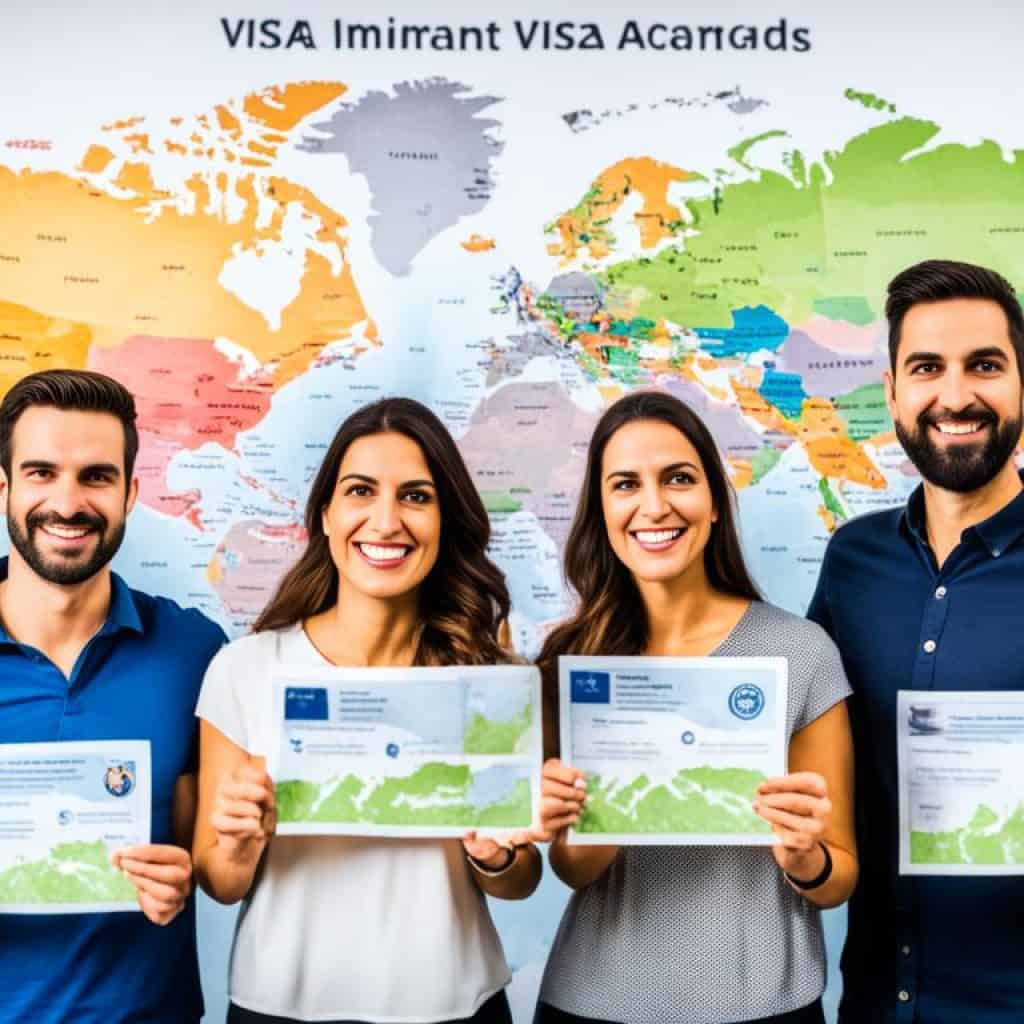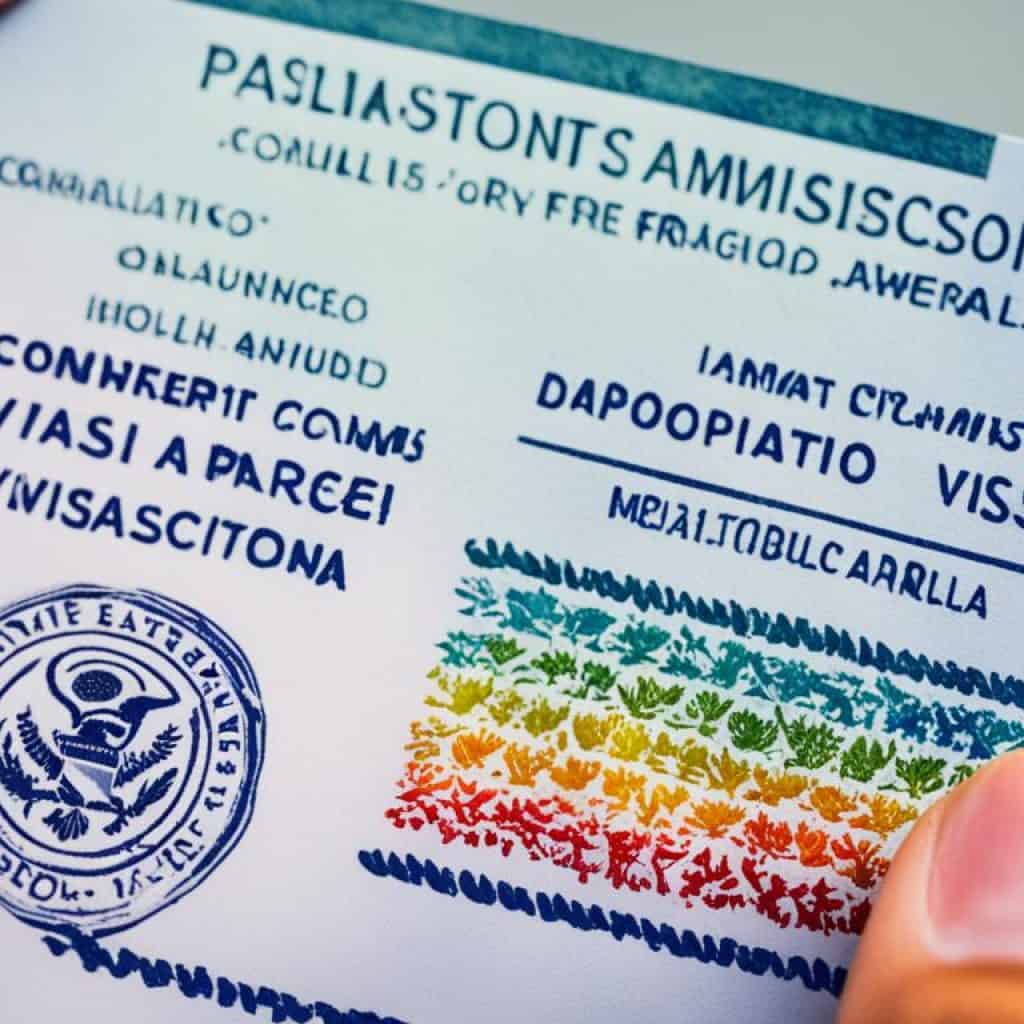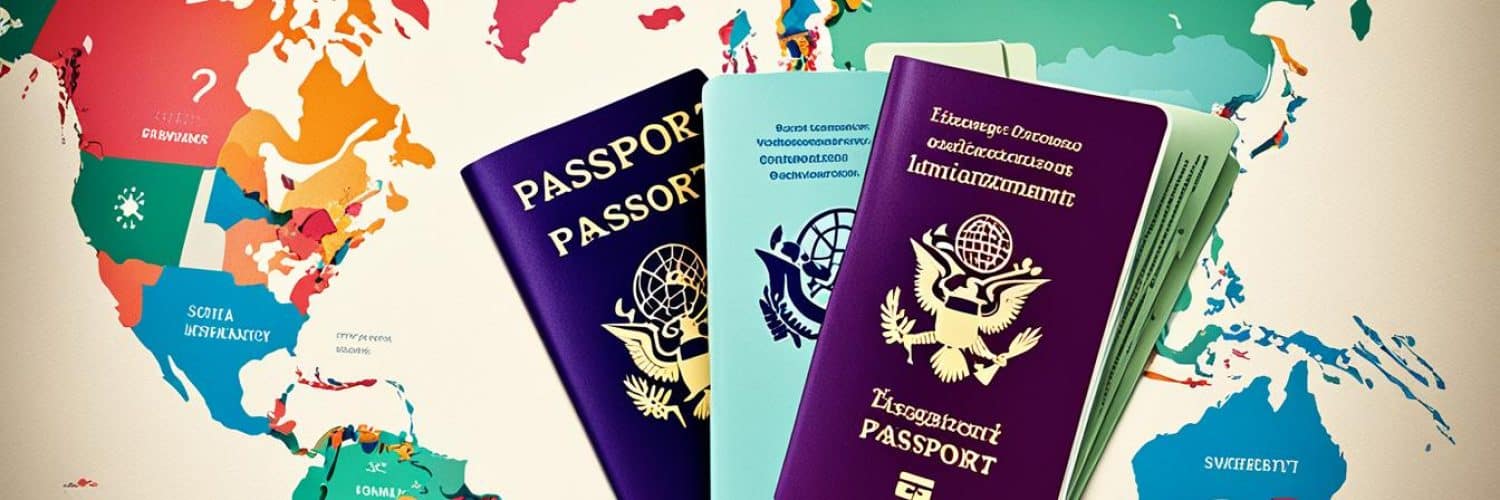Are you considering immigrating to the United States? The process can be complex and overwhelming, especially when it comes to understanding the different visa categories available. But fear not! In this comprehensive guide, we will demystify the world of immigrant visas and provide you with a clear and concise overview of the options.
From understanding the immigrant visa application process to exploring the various visa types for immigrants, we’ve got you covered. Whether you’re seeking to reunite with family, pursue employment opportunities, or fulfill your American dream, this guide will help you navigate the path towards obtaining a US immigrant visa.
So, if you’re ready to embark on your journey to permanent residency in the United States, keep reading to discover the fascinating world of immigrant visa categories.
Key Takeaways:
- There are two categories of US visas: immigrant and nonimmigrant.
- Immigrant visas are for individuals who intend to live permanently in the United States.
- Nonimmigrant visas are for temporary stays in the US.
- Applying for an immigrant visa involves sponsorship by a relative or employer.
- There are various immigrant visa classifications, each with specific requirements.
Immigrant Visa vs Nonimmigrant Visa
When it comes to visas for entering the United States, there are two main categories: immigrant visas and nonimmigrant visas. While both serve their respective purposes, understanding the differences between the two is crucial for individuals planning to visit or move to the country.
Immigrant Visa
An immigrant visa is designed for individuals who intend to live and work permanently in the United States. It offers the opportunity to become a lawful permanent resident, also known as a Green Card holder. This type of visa allows individuals to pursue long-term goals, such as establishing a permanent residence, seeking employment opportunities, and eventually applying for U.S. citizenship.
Nonimmigrant Visa
On the other hand, a nonimmigrant visa is granted to foreign nationals who wish to enter the United States for temporary purposes. This visa allows individuals to visit the country on a temporary basis for reasons such as tourism, business meetings, medical treatment, temporary work assignments, educational programs, or cultural exchanges. Unlike an immigrant visa, a nonimmigrant visa does not offer permanent residency or a pathway to citizenship.
Nonimmigrant visas are typically granted for a specific period, ranging from a few days to several years, depending on the purpose of the visit and the type of visa. It is important to note that nonimmigrant visa holders must depart the United States before their authorized stay expires or apply for an extension if necessary.
Whether an immigrant visa or a nonimmigrant visa is appropriate depends on an individual’s long-term goals and intentions. Immigrant visas are suitable for those seeking permanent residency, while nonimmigrant visas are ideal for temporary stays on a temporary basis.
“Understanding the distinctions between immigrant and nonimmigrant visas is crucial for individuals planning to visit or move to the United States. Whether you aspire to live permanently in the U.S. or need a visa for a temporary stay, knowing the right visa category to apply for will help you navigate the complex immigration process with confidence.”
Applying for an Immigrant Visa
Applying for an immigrant visa in the United States is a multi-step process that requires sponsorship and coordination with the U.S. Citizenship and Immigration Services (USCIS). Immigrant visas are typically obtained through family members or employers who file an application on behalf of the individual seeking permanent residency.
One of the key aspects of the application process is obtaining sponsorship. This means that an individual must have a relative or employer who is willing to sponsor their application and vouch for their eligibility to immigrate to the United States. The sponsor files an immigrant visa petition with the USCIS, providing evidence of the qualifying relationship or employment offer.
Gaining Independence: Self-Petition
While sponsorship is commonly required, there are certain immigration categories that allow individuals to petition for themselves. For example, individuals with extraordinary abilities in fields such as science, arts, education, business, or athletics can self-petition for an immigrant visa. Additionally, investors who meet specific investment criteria may also be eligible to apply on their own behalf.
Once the application is filed and approved by the USCIS, it is forwarded to the appropriate U.S. Consulate or Embassy for further processing. It’s important to note that the specific timeline and procedures may vary depending on the immigrant visa category and the U.S. Consular post.
Working with Immigration Services
The immigrant visa process can be complex, and it’s advisable to seek assistance from immigration services providers. These professionals have the expertise and knowledge to guide individuals through the application process, ensuring that all documentation and requirements are met.
To increase the chances of a successful visa application, working with immigration services can provide valuable support and guidance. They can help individuals understand the required documentation, prepare for the visa interview, and ensure compliance with all immigration laws and regulations.
| Benefits of Working with Immigration Services | Examples of Services Provided |
|---|---|
| Expert guidance throughout the application process | Assistance with document preparation and submission |
| Ensuring compliance with immigration laws and regulations | Representation in communication with USCIS and U.S. Consular posts |
| Improved chances of a successful visa application | Preparation for the visa interview process |
Seeking immigration services can simplify the application process and alleviate potential challenges or uncertainties. By partnering with professionals experienced in immigration matters, individuals can navigate the complex immigration system and increase their chances of a successful immigrant visa application.
Immigrant Visa Classifications and Requirements
When it comes to obtaining an immigrant visa to the United States, it’s important to understand the various immigrant visa classifications and their specific requirements. Each classification has its own set of criteria that applicants must meet to be eligible for consideration.
For a comprehensive overview of the immigrant visa classifications and their respective requirements, individuals can refer to the official websites of the U.S. Citizenship and Immigration Services (USCIS) and the Department of State. These websites provide detailed information on the eligibility criteria, application process, and documentation needed for each immigrant visa category.

Immigrant Visa Classifications
To give you an idea of the range of immigrant visa classifications available, here is a table outlining some of the most common categories:
| Visa Classification | Description | Eligibility Requirements |
|---|---|---|
| Family-Based Immigration | Allows eligible individuals to apply for an immigrant visa based on their familial relationship with a U.S. citizen or green card holder. | Relationship to a U.S. citizen or green card holder, sponsorship by a qualifying family member, and meeting other specific criteria. |
| Employment-Based Immigration | For individuals seeking to immigrate to the United States based on employment or investment opportunities. | Employment or investment offer, extraordinary abilities, investment capital, and other specific requirements. |
| Adoption | Facilitates the legal immigration process for adoptive parents and ensures the welfare and protection of children. | Approved orphan petition, suitability as adoptive parents, and compliance with U.S. adoption laws. |
| Special Immigrant | Reserved for individuals who qualify under specific categories, such as former U.S. government employees, Afghan and Iraqi translators, and religious workers. | Meeting the specific eligibility criteria outlined for each special immigrant category. |
| Diversity Visa Program | An annual lottery program that provides a limited number of visas to individuals from countries with low rates of immigration to the United States. | Eligibility based on citizenship, education, and work experience, among other factors. |
It’s essential to thoroughly review the requirements for each immigrant visa classification and gather all the necessary documentation before starting the application process. By understanding the specific criteria for each category, individuals can ensure they meet the eligibility requirements and increase their chances of obtaining an immigrant visa.
Remember, achieving your dream of immigrating to the United States requires careful preparation and adherence to the immigration laws and regulations. Make use of the resources available on the USCIS and Department of State websites to ensure you have accurate and up-to-date information.
Nonimmigrant Visa Categories
Nonimmigrant visas offer a temporary entry into the United States for various purposes, including tourism, business, temporary work, study, and medical treatment. Depending on the nature of your visit, you may need a specific type of nonimmigrant visa to comply with the requirements. Additional authorization and documentation may also be necessary for certain visa categories.
Tourism
If you plan to visit the United States for leisure or vacation purposes, a nonimmigrant visa for tourism, commonly known as a B-2 visa, may be required. This visa allows you to explore the country, visit family and friends, and engage in tourist activities.
Business
For individuals seeking to engage in business-related activities in the United States, a nonimmigrant visa for business, often referred to as a B-1 visa, is necessary. This visa category permits activities such as attending conferences, negotiating contracts, consulting with business partners, and participating in training programs.
Temporary Work
If you have been offered a temporary employment opportunity in the United States, you will typically need a nonimmigrant visa for temporary work. Examples of such visas include the H-1B visa for specialty occupations, the L-1 visa for intracompany transferees, and the O-1 visa for individuals with extraordinary abilities in their fields.
Study
Individuals who wish to pursue academic studies or enroll in educational programs in the United States will require a nonimmigrant visa for study purposes. The most common visa category for students is the F-1 visa, which allows for enrollment in academic institutions, language training programs, and vocational schools.
Authorization and Documentation
While the specific requirements for each nonimmigrant visa category vary, certain forms of authorization and documentation are commonly needed. These may include proof of financial capability for the duration of the visit, a valid passport, a visa application, a DS-160 confirmation page, a photograph that adheres to the specified requirements, and evidence of ties to the home country.
Visa Waiver Program
The Visa Waiver Program (VWP) offers a convenient option for citizens of designated countries to travel to the United States without the need to obtain a visa. This program allows nonimmigrant visitors to enjoy visa-free travel to the United States for up to 90 days, whether for business or pleasure purposes.
Under the Visa Waiver Program, eligible travelers can explore the bustling cities, stunning landscapes, and iconic landmarks that the United States has to offer, without the hassle of a visa application process. Whether you’re looking to attend a conference, embark on a sightseeing adventure, or visit family and friends, the VWP provides an opportunity to experience the diverse culture and opportunities that await within the country.
However, it’s important to note that travelers under the VWP must meet specific eligibility requirements and adhere to certain guidelines. These requirements include possessing a valid passport from a designated VWP country and having an approved travel authorization through the Electronic System for Travel Authorization (ESTA) prior to boarding a flight to the United States.
While the VWP allows for visa-free travel, it’s essential for visitors to be aware of the limitations. Nonimmigrant visitors under the VWP are only permitted to stay in the United States for a maximum of 90 days, whether it’s for business or pleasure purposes. If an extended stay is required or if the purpose of travel exceeds the authorized period, it may be necessary to apply for a B-2 visa for tourism or a B-1 visa for business.
Understanding the Visa Waiver Program and its requirements ensures a smooth and hassle-free travel experience for eligible visitors. By familiarizing yourself with the guidelines and discussing your travel plans with the U.S. embassy or consulate in your home country, you can make the most of your visa-free journey to the United States.
Benefits of the Visa Waiver Program
- No need to apply for a visa
- Visa-free travel for up to 90 days
- Opportunity to explore the United States for business or pleasure
- Convenient and streamlined travel authorization process through ESTA
Immigrant Visa Eligibility and Admission
It’s important to understand that obtaining a visa is not a guarantee of entry into the United States. Upon arrival, individuals must undergo an inspection conducted by U.S. Customs and Border Protection (CBP) officers to assess their eligibility for admission under U.S. immigration law.
CBP officers play a crucial role in enforcing immigration laws at ports of entry. They have the authority to make decisions regarding admission, visa validity, and length of stay in the United States. These officers carefully review documentation, conduct interviews, and assess the applicant’s eligibility for admission.
“The CBP officer will review your visa, passport, and other relevant documents. It is important to be honest and transparent during the interview process to ensure a smooth admission into the United States.” – CBP Officer Smith
Visa Eligibility Assessment
During the inspection, CBP officers assess whether the individual meets the visa eligibility requirements under U.S. immigration law. Factors considered include:
- Evidence of a valid and unexpired visa
- Valid passport
- Demonstration of a bona fide purpose for entering the United States
- Compliance with visa category-specific requirements
- Sufficient funds to support themselves during the stay
- Intention to depart the United States at the end of the authorized period
If the CBP officer determines that the individual is eligible for admission, they will be granted entry into the United States and directed further to their destination. However, if the officer finds ineligibility, the person may be refused entry and subject to removal proceedings.
Admission to the United States
Admission to the United States allows individuals to enter the country legally and stay for the duration specified by their visa. CBP officers have the authority to grant admission typically for a specific period, as determined by the visa type and the purpose of travel.
It is essential to comply with the terms and conditions of the visa and adhere to the authorized stay to maintain valid immigration status. Failure to do so may result in future ineligibility for entry into the United States or other legal consequences.

| Visa Eligibility Criteria | Admission Decision |
|---|---|
| Valid and unexpired visa | Granted entry into the United States |
| Valid passport | Granted entry into the United States |
| Evidence of a bona fide purpose for entering the United States | Granted entry into the United States |
| Compliance with visa category-specific requirements | Granted entry into the United States |
| Sufficient funds to support themselves during the stay | Granted entry into the United States |
| Intention to depart the United States at the end of the authorized period | Granted entry into the United States |
Eligibility for Visa-Free Travel
Under the Visa Waiver Program, citizens of certain countries have the opportunity to travel to the United States without the need for a visa. This program allows for a streamlined entry process, making it easier for eligible travelers to visit the country for business or pleasure purposes. To determine your eligibility for visa-free travel, you must meet specific requirements:
- Travel Restrictions: Citizens of participating countries must adhere to certain travel restrictions, such as a maximum stay of 90 days and limitations on employment or study while in the United States.
- Financial Solvency: Travelers must possess sufficient funds to cover their stay in the United States and any associated expenses.
- Machine-Readable Passport: A valid machine-readable passport is required for visa-free travel. The passport must be valid for at least six months beyond the intended stay.
- Arrival/Departure Form I-94W: Travelers must complete the Arrival/Departure Form I-94W, which provides important information about their visit to the United States.
By meeting these requirements, you can enjoy the benefits of visa-free travel to the United States. However, it is essential to familiarize yourself with the specific regulations and guidelines of the Visa Waiver Program to ensure a smooth and hassle-free journey.
Additional Information:
“Visa-free travel under the Visa Waiver Program allows eligible individuals to experience the beauty and diversity of the United States without the need for a traditional visa. It streamlines the travel process, making it more accessible and convenient for qualified travelers. With proper documentation and compliance with program requirements, you can embark on your journey to the United States with ease and peace of mind.”
Immigrant Visa Categories - Family Based
The family-based immigrant visa category provides an opportunity for eligible individuals to obtain an immigrant visa based on their familial relationship with a U.S. citizen or lawful permanent resident (green card holder). This category recognizes the importance of family unity in the immigration process, allowing U.S. citizens and green card holders to sponsor their family members for immigration to the United States.
U.S. citizens can sponsor the following family members for an immigrant visa:
- Spouses
- Parents
- Children (unmarried and under 21 years old)
- Siblings (if the sponsor is at least 21 years old)
Lawful permanent residents (green card holders) can sponsor the following family members for an immigrant visa:
- Spouses
- Unmarried children (under 21 years old)
It is important to note that there are specific requirements and processes to follow when applying for a family-based immigrant visa. The U.S. citizen or green card holder sponsor must file a petition with the U.S. Citizenship and Immigration Services (USCIS) on behalf of their family member. Once the petition is approved, the family member can proceed with the immigrant visa application process.
“Family is not an important thing, it’s everything.” – Michael J. Fox
Family based immigration provides an opportunity for loved ones to be reunited and build their lives together in the United States. It promotes strong family ties and supports the values of unity and togetherness.
Benefits of Family Based Immigration
Family based immigration offers several advantages:
- Allows families to live together and share their lives in the United States.
- Provides opportunities for spouses to join their partners and create a life together.
- Allows parents to be reunited with their children.
- Enables U.S. citizens and green card holders to support and care for their siblings.
| Family Member | Eligible Sponsor |
|---|---|
| Spouse | U.S. Citizen or Lawful Permanent Resident (Green Card Holder) |
| Parent | U.S. Citizen |
| Child | U.S. Citizen or Lawful Permanent Resident (Green Card Holder) |
| Sibling | U.S. Citizen (sponsor must be at least 21 years old) |
Family based immigration provides a pathway to reunite families and build a future together in the United States. It highlights the importance of strong family bonds and the value of family unity in the immigration process.
Immigrant Visa Categories - Employment
The employment-based immigrant visa category provides a pathway for individuals looking to immigrate to the United States through employment or investment opportunities. This category encompasses various visa options tailored to individuals with extraordinary abilities, investors, and certain special immigrant categories.
Employment-Based Immigration:
- Permanent Employment: This visa category is designed for individuals who have been offered permanent employment in the United States. It requires sponsorship from a U.S. employer and approval from the U.S. Citizenship and Immigration Services (USCIS).
- Investment: Individuals with substantial financial resources can explore the option of an employment-based visa through investment. This category, known as the EB-5 Immigrant Investor Program, requires making a qualifying investment in a new commercial enterprise that will create jobs for U.S. workers.
- Entrepreneurs: Entrepreneurs who have innovative business ideas or have already established successful businesses outside the United States may be eligible for the employment-based visa under the EB-2 National Interest Waiver category. This visa allows individuals to bypass the labor certification process by demonstrating that their work will significantly benefit the national interests of the United States.
Extraordinary Ability:
Individuals with exceptional abilities in the fields of sciences, arts, education, business, or athletics may qualify for the EB-1A visa category. This visa is designed for those who have risen to the top of their field and have sustained national or international acclaim.
Investor Visas:
The employment-based visa category also includes several investor visa options, such as the EB-5 Immigrant Investor Program mentioned earlier. Additionally, individuals who invest in targeted employment areas or regional centers may be eligible for the EB-5 Immigrant Investor Pilot Program.
Special Immigrant Categories:
There are specific employment-based immigrant visa categories that cater to individuals with unique qualifications and circumstances. This includes visas for religious workers, certain international organization employees, and employees of U.S. government agencies abroad.
| Visa Category | Description |
|---|---|
| EB-1A | Extraordinary ability individuals |
| EB-1B | Outstanding professors and researchers |
| EB-1C | Managers and executives of multinational companies |
| EB-2 | Professionals with advanced degrees |
| EB-2 NIW | Advanced degree professionals with exceptional abilities (National Interest Waiver) |
| EB-3 | Skilled workers, professionals, and other workers |
| EB-4 | Special immigrants, including religious workers and employees of U.S. government agencies abroad |
| EB-5 | Investors |
Understanding the available employment-based immigrant visa categories is essential for individuals considering long-term opportunities in the United States. By exploring these options and meeting the respective requirements, aspiring immigrants can navigate the immigration process successfully.

Immigrant Visa Categories - Adoption
The adoption immigrant visa category provides a pathway for individuals who wish to adopt orphans currently residing outside of the United States. This category is designed to facilitate the legal immigration process for adoptive parents while ensuring the welfare and protection of children.
Intercountry adoption allows families to provide a loving and stable home for orphaned children, giving them the opportunity for a better future. The process involves adopting a child from another country and bringing them to the United States to become a permanent member of the family.
Adoptive parents must meet certain requirements and navigate the legal process to obtain an immigrant visa for their adopted child. This process may involve working with adoption agencies, completing necessary paperwork, and complying with the adoption laws of both the child’s home country and the United States.
Once the adoption is finalized and the necessary documentation is obtained, the child can apply for an immigrant visa to enter the United States. The U.S. Citizenship and Immigration Services (USCIS) oversees the processing of immigrant visa applications and ensures that all legal requirements are met.
Adoption not only provides a loving home for children in need but also grants them access to various benefits, including U.S. citizenship. Upon entering the United States with an immigrant visa, adopted children become eligible for U.S. citizenship. This citizenship ensures that they have the same rights and privileges as any other U.S. citizen.
It is important for adoptive parents to understand the specific requirements and procedures involved in intercountry adoption and the immigrant visa process. Seeking guidance from experienced adoption professionals and immigration attorneys can help navigate the complexities and ensure a smooth transition for both the child and the family.
Key Points:
- The adoption immigrant visa category allows individuals to adopt orphans residing outside of the United States.
- Intercountry adoption is a process that involves adopting a child from another country and bringing them to the United States.
- Adoptive parents must meet requirements and navigate the legal process to obtain an immigrant visa for the adopted child.
- Adopted children become eligible for U.S. citizenship upon entering the United States with an immigrant visa.
- Consulting adoption professionals and immigration attorneys can help ensure a smooth process and transition for the family.
Immigrant Visa Categories - Special Immigrant
The special immigrant visa category offers a unique opportunity for individuals who fall under specific categories to obtain an immigrant visa and settle in the United States. This category is specifically designed for former U.S. government employees, Afghan and Iraqi translators, and religious workers.
If you have worked as a U.S. government employee overseas and are seeking to start a new life in the United States, the special immigrant visa provides a pathway for you. It recognizes your contributions and dedication to public service and offers the chance to become a permanent resident in the country.
Afghan and Iraqi translators who have assisted the U.S. military during their deployment also qualify for the special immigrant visa. This visa category acknowledges the vital role they played in supporting U.S. operations and offers them the opportunity to live and work in the United States.
Religious workers who wish to pursue their calling in the United States can also avail themselves of the special immigrant visa. This category allows religious workers from designated religious organizations to continue their work and contribute to the diversity of religious practices in America.
By providing a pathway for special immigrants, the U.S. government recognizes the unique circumstances and contributions of individuals who have dedicated themselves to public service, language translation, and religious practices. If you fall under any of these categories, the special immigrant visa may be the key to realizing your dreams of living in the United States.
| Beneficiary | Requirements |
|---|---|
| Former U.S. Government Employees | Documentation supporting previous employment |
| Afghan and Iraqi Translators | Evidence of employment as a translator for the U.S. military |
| Religious Workers | Proof of membership and employment with a designated religious organization |
With the special immigrant visa, you can take the first step towards building a new life in the United States. The next section will explore another immigrant visa category – the Diversity Visa Program, also known as the green card lottery – which offers a unique opportunity for individuals from countries with low rates of immigration.
Immigrant Visa Categories - Diversity Visa
The diversity visa program, also known as the green card lottery, is an annual program that provides a limited number of visas to individuals from countries with low rates of immigration to the United States. This program aims to promote diversity and provide opportunities for individuals from underrepresented regions to obtain permanent residency in the United States.
To be eligible for the diversity visa program, applicants must meet specific eligibility requirements set by the U.S. Department of State. These requirements typically include having a high school education or equivalent work experience, and being a national of a qualifying country. The list of qualifying countries is determined each year and can be found on the Department of State’s official website.
Once eligible, applicants can submit their application through the online portal during the specified registration period. It’s important to note that there is no fee to enter the diversity visa program, as the selection process is based on a random computer-generated drawing.
“The diversity visa program provides a unique opportunity for individuals from countries with low rates of immigration to the United States. It allows them to pursue their dream of living and working in this diverse and prosperous country.”
Successful applicants, also known as diversity visa winners, will be notified through the online portal after the random drawing. They will then proceed with the immigrant visa application process, including submitting documentation and attending an interview at the U.S. Consulate or Embassy in their home country.
Benefits of the Diversity Visa Program:
- Offers individuals from underrepresented countries the chance to obtain permanent residency in the United States
- Promotes diversity and cultural exchange within the United States
- Provides opportunities for individuals with limited immigration options
- Allows winners to bring their immediate family members with them to the United States
It’s important to note that winning the diversity visa lottery does not guarantee a visa or permanent residency. The number of diversity visas available each year is limited, and applicants must meet all the necessary requirements and undergo the standard immigrant visa application process.
Diversity Visa Program
| Program Name | Key Information |
|---|---|
| Program Type | Immigrant Visa Category |
| Objective | To provide opportunities for individuals from countries with low rates of immigration to the United States |
| Eligibility Requirements |
|
| Application Process |
|
| Notification | Winners will be notified through the online portal |
| Further Processing | Winners proceed with the standard immigrant visa application process |
Winning the diversity visa lottery provides a unique opportunity for individuals to pursue their dreams of living and working in the United States. It offers a chance to experience the diversity and opportunities that the country has to offer. For more information and to stay updated on the diversity visa program, individuals should visit the U.S. Department of State’s official website.
Conclusion
This Immigrant Visa Guide provides a comprehensive overview of the different visa options and pathways to pursuing permanent residency in the United States. Aspiring immigrants can explore various avenues such as family-based sponsorship, employment-based opportunities, adoption, special immigrant categories, and the diversity visa program.
Understanding the intricacies of the immigration process is crucial for successfully navigating the path to permanent residency. By familiarizing oneself with the specific requirements and documentation needed for each visa category, individuals can proceed with confidence and make informed decisions about their future in the United States.
With the right knowledge, guidance, and careful planning, individuals can take the necessary steps towards achieving their goal of permanent residency in the United States. It is important to consult with qualified immigration professionals or seek assistance from government agencies to ensure compliance with immigration laws and regulations.
FAQ
What is the difference between an immigrant visa and a nonimmigrant visa?
An immigrant visa is for individuals who want to live permanently in the United States, while a nonimmigrant visa is for temporary stays.
How do I apply for an immigrant visa?
To apply for an immigrant visa, you must be sponsored by a relative or an employer who files an application with the U.S. Citizenship and Immigration Services (USCIS).
What are the requirements for an immigrant visa?
What are nonimmigrant visas used for?
Nonimmigrant visas are used for temporary purposes such as tourism, business, medical treatment, temporary work, or study.
What is the Visa Waiver Program?
The Visa Waiver Program allows citizens of certain countries to travel to the United States without obtaining a visa for stays of up to 90 days for business or pleasure purposes.
Do I need a visa to enter the United States?
Whether you need a visa depends on your country of citizenship and the purpose of your visit. Some countries are eligible for visa-free travel under the Visa Waiver Program.
What are the immigrant visa categories based on?
There are several immigrant visa categories, including family-based, employment-based, adoption, special immigrant, and the diversity visa program. Each category has its own specific requirements.
How can I immigrate to the United States based on family ties?
You can apply for an immigrant visa through the family-based category if you have a qualifying relationship with a U.S. citizen or a green card holder.
Can I immigrate to the United States based on employment?
Yes, there are employment-based immigrant visa categories available for individuals seeking to immigrate based on employment or investment opportunities.
How does the adoption immigrant visa category work?
The adoption immigrant visa category facilitates the legal immigration process for individuals who wish to adopt orphans residing outside of the United States. This category ensures the welfare and protection of children.
Who qualifies for a special immigrant visa?
Individuals who qualify under specific categories, such as former U.S. government employees, Afghan and Iraqi translators, and religious workers, are eligible for a special immigrant visa.
What is the diversity visa program?
The diversity visa program, also known as the green card lottery, provides a limited number of visas to individuals from countries with low rates of immigration to the United States. Eligibility requirements and application procedures are outlined by the U.S. Department of State.








Add comment